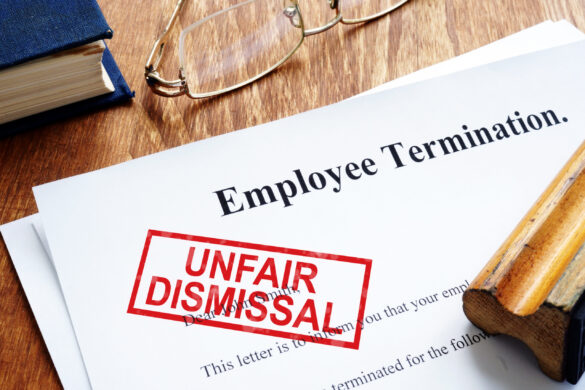If going to work causes you anxiety or distress because of ongoing mistreatment, harassment, or bullying, you may be dealing with more than just a difficult workplace. You could be experiencing what Maryland law defines as a hostile work environment.
Maryland workers have legal protections, but many are unaware of their employee rights or unsure of how to exercise them. At Lebau & Neuworth, we help individuals understand whether your experiences meet the legal definition of a hostile work environment and guide you through the steps to assert your rights and protect yourself in the face of injustice.
What Qualifies as a Hostile Work Environment in Maryland?
A hostile work environment exists when unwelcome, discriminatory conduct becomes so frequent or severe that it creates an abusive or intimidating workplace. This conduct must interfere with an employee’s ability to perform their job and must be based on legally protected characteristics.
Under both federal law (Title VII of the Civil Rights Act) and Maryland law (MFEPA: Maryland Fair Employment Practices Act), a hostile work environment often involves harassment based on:
- Race or color
- Sex, sexual orientation, gender identity, or pregnancy
- Religion
- National origin
- Age
- Disability
- Marital status
- Genetic information
Signs of Workplace Harassment and Bullying
Recognizing when workplace behavior crosses the legal threshold can be difficult. Many employees experience hostility for months or even years before realizing they have grounds for legal action. Common signs of a hostile work environment include:
- Repeated offensive jokes, slurs, or comments based on race, gender, or another protected category
- Unwelcome sexual advances, suggestive remarks, or inappropriate messages
- Being excluded from meetings or projects without valid reason
- Unequal treatment in work assignments or performance evaluations
- Public ridicule or humiliation by coworkers or supervisors
- Constant, baseless criticism or attempts to undermine performance
- Retaliation after raising concerns or supporting another employee's complaint
Even if the person responsible claims they were "just joking," the law evaluates how the conduct affects your ability to work, not the intent behind it. Don’t let yourself be manipulated into believing the harassment you are experiencing is normal. Reach out to an experienced workplace discrimination lawyer to discuss your potential claim.
Steps to Take: Document, Report, Protect Yourself
If you believe you are working in a hostile environment, it is important to take steps to protect yourself and preserve your rights. Consider the following actions:
- Document everything: Keep detailed records of incidents, including dates, times, individuals involved, and any witnesses. Save emails, messages, or other communications that support your experience.
- Report the behavior: Follow your employer’s internal procedures for reporting harassment. Submit your complaint in writing and retain a copy. Reporting the issue formally demonstrates that you gave your employer the opportunity to address the problem.
- Prioritize your mental health: Talk to a trusted friend, counselor, or therapist. Harassment can take a toll on your emotional well-being, and it is important to have support.
- Consult a qualified attorney: If your employer fails to take action or if the harassment continues, legal counsel can help you understand your options. An attorney can also guide you in preparing a claim and advocating for your rights under Maryland and federal law.
Maryland and Federal Laws Protecting Employees
Employees in Maryland are protected by a combination of federal and state laws that prohibit discrimination, harassment, and retaliation in the workplace.
- Title VII of the Civil Rights Act: Applies to employers with 15 or more employees and prohibits workplace harassment based on protected characteristics.
- Maryland Fair Employment Practices Act (MFEPA): Covers employers with as few as 15 employees and offers broader protections under Maryland law.
- Senate Bill 450 (2024 Maryland Law Update): Removes the “severe or pervasive” requirement for sexual harassment claims under Maryland law. This update makes it easier for employees to bring valid claims when facing sexual harassment in the workplace.
- Maryland Commission on Civil Rights (MCCR): Enforces state anti-discrimination laws and accepts workplace harassment complaints for investigation.
- Equal Employment Opportunity Commission (EEOC): The federal agency that enforces Title VII and investigates claims of workplace discrimination and harassment.
An experienced hostile work environment lawyer in Maryland can help you understand which laws apply to your situation and determine the best course of action to seek justice on your behalf.
Filing with the EEOC or MCCR: Deadlines You Cannot Miss
There are strict deadlines for filing a workplace harassment claim. Missing these deadlines may limit your ability to seek legal remedies so it is important to act fast.
- EEOC: You must file a complaint within 300 days of the last incident of harassment.
- MCCR: You also have 300 days under Maryland law to file with the Commission.
While you can file with either agency, speaking with a workplace harassment attorney can help you determine the best strategy based on the facts of your case. Filing with one agency usually protects your rights under both state and federal law.
Remote Harassment and the “New Workplace” in Maryland
With many employees now working remotely or in hybrid roles, workplace harassment has taken new forms. Maryland laws protect employees from harassment even when it occurs outside a traditional office setting.
Examples of remote harassment include:
- Inappropriate messages through email or internal chat systems
- Harassing comments during video meetings
- Exclusion from virtual meetings or collaborative platforms
- Use of personal contact information to send offensive content outside work hours
If you are being harassed while working remotely, you still have full protection under Maryland employment law. The digital distance does not give anyone an excuse to make your work life worse.
Retaliation After Reporting Harassment: Your Rights
It is illegal for an employer to retaliate against you for reporting workplace harassment or participating in an investigation. It is your employers responsibility to acknowledge what is happening and make amends. Retaliation may look like:
- Termination or demotion
- Poor performance reviews
- Reduction in hours or duties
- Exclusion from meetings or key decisions
- Hostile behavior from supervisors or coworkers
Even if the original harassment complaint is not ultimately proven, it is unlawful for your employer to punish you for raising concerns in good faith. Retaliation is a separate legal claim that can be pursued in addition to a harassment complaint.
When to Contact a Hostile Work Environment Lawyer in Maryland
If you feel unsafe, unsupported, or targeted at work, you do not have to face the situation alone. Speaking with an experienced workplace harassment attorney can help you determine whether your experience qualifies as a hostile work environment. You may be entitled to financial compensation, reinstatement, or other remedies.
At Lebau & Neuworth, we represent employees across Maryland who have been subjected to harassment, discrimination, or retaliation in the workplace. We understand the emotional and professional toll these experiences can take, and we are committed to helping you take action with confidence and dignity.
Whether you are still employed or have been forced to leave, we can help you evaluate your options and build a strong legal case.
Contact us at (410) 296-3030 to schedule a confidential free consultation.
Your workplace should be a place of respect and professionalism. If your job fails to uphold this simple responsibility to you, we can help you get the justice you deserve for your unfair treatment.












